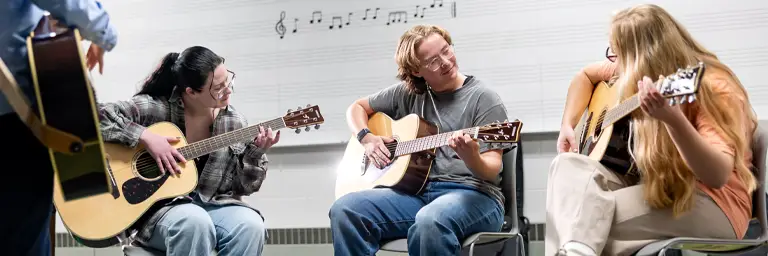Music Therapy Degree
Explore how the healing power of music can open doors to a career in healthcare and therapeutic professions.
UND’s Music Therapy program is the only one of its kind in North Dakota, offering hands-on education in a rapidly growing field. With strong regional partnerships, experienced faculty and a blend of music and clinical training, you'll be prepared for impactful careers in health, education and beyond.
- Program type:
- Major
- Format:
- On Campus
- Est. time to complete:
- 4.5 years
- Credit hours:
- 123
Why earn a Music Therapy degree?
Music Therapy Degree at UND
-
Join the only Music Therapy bachelor's program offered in North Dakota, South Dakota, Montana, Nebraska, Idaho and Wyoming.
-
Gain on-the-job experience through field internships in popular settings such as senior centers/assisted living facilities, hospitals and schools.
-
As the field of music therapy continues to expand, you can engage in research alongside faculty who are active in the field.
-
The Music Therapy program at UND welcomes students from any major, including music education, nursing, psychology and other pre-med areas. Our flexible programs make it easy to transition between fields. We also support returning professionals and dual-career educators.
-
You will be eligible to take the national board certification exam to obtain the credential MT–BC (Music Therapist – Board Certified) upon completion of your undergraduate coursework and subsequent six-month internship. Completion of both the exam and then internship is required for professional practice.
-
The Department of Music awards many generous scholarships on the basis of superior musicianship. Learn more about how to audition and scholarship deadlines here.
What can you do with a Music Therapy degree?
Music Therapy Degree Courses
FAQs
Music therapy coursework will take four years to complete, after which you must finish a six-month music therapy internship.
Commitment to the designed coursework and making time for immersing yourself in the course content. This degree you’ve chosen is an exciting field-but there’s a lot to learn. Take every opportunity you can here at UND to dive into the world of music therapy.
UND music therapy will provide a wide variety of practicum experiences. You’ll have opportunities to work with folks across the age span, and in settings ranging from Altru Hospital to Grand Forks Public Schools to Valley Senior Living Facilities.
Yes, each music therapy major will need to choose a primary instrument for which they will receive individual lessons for at least six semesters.
Music therapy majors must be proficient in voice, guitar, piano, and percussion. Knowing the basics on all of these instruments is helpful, but the curriculum has been designed to support your development on these instruments.
No, buying a guitar is not required, but it would be helpful to have one so that you can have greater access to practice when not at UND.
